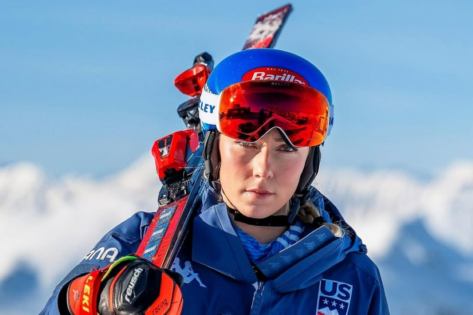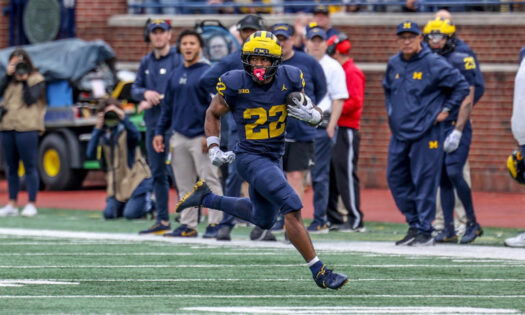Mikaela Shiffrin has always looked fearless on the slopes, like she was born to win, born to glide through pressure. But even the strongest hit breaking points. And for Shiffrin, that moment came crashing down literally in November 2024. One minute she was leading a World Cup race, and the next, she was flying through the air, slamming into gates, and landing in a tangled heap against the fencing. That crash didn’t just leave her with a punctured side; it left her wondering if she’d ever feel like herself again. And now, more than six months later, she admits the trauma still feels like it happened yesterday.
It all went down on November 30 in Killington, Vermont. Mikaela was leading after her first run of the giant slalom; everything was looking golden. But on that second run, something went wrong. She lost an edge near the bottom of the course, flipped over, hit two gates, and crashed hard into the safety net. The impact left her with a deep puncture wound to her right side and serious trauma to her obliques.
While doctors were relieved that no bones or internal organs were damaged, the injury was still bad enough to require surgery, and even worse, it sent her down a spiral of PTSD she never saw coming. And it wasn’t just the physical pain that shook her. On Instagram, Mikaela Shiffrin shared what those first moments felt like after the crash, moments that are burned into her memory.
“But this pain … this was a new one for me. I was just sitting there on the side of the slope. Unable to move. Unable to really even breathe.” This is someone who knows pain, bruises, broken bones, and wiped-out knees; it comes with the territory of skiing. But this time, it wasn’t just pain. No, it was helplessness. It was fear. It was the moment her confidence cracked.
She remembers being pulled down the slope on a sled, hearing the award ceremony music playing in the distance, and people clapping and celebrating. All she could think about was how much she wanted to be there cheering on the other women, telling them they were amazing. But after the crash, when she watched the video over and over, she felt just how confusing and frustrating the whole thing was.
Physically, she felt great, skiing at her best, and yet the crash happened out of nowhere. As Mikaela Shiffrin said, “Nothing about it made sense. There was nothing to put my finger on. No real lessons to learn. I just kind of had to get back on the horse to power through. And what I didn’t fully comprehend at the time is … my mind wasn’t completely ready for something like that.”
Usually, athletes can pinpoint what went wrong and adjust, but this time, there was no clear reason. Powering through physically wasn’t enough; her mind needed healing, too. That realization led her to face a new challenge: PTSD. But how did she recognize the PTSD?
Mikaela Shiffrin’s quiet battle with PTSD
In the months that followed her terrifying crash, Mikaela Shiffrin began experiencing what she later understood as PTSD. At first, she didn’t even recognize it. She returned to training and felt fine on the surface, but then, mid-run, her body would freeze. She’d suddenly stop, without planning to. In her mind, violent crash images played on repeat. “I’d see myself falling and going down,” she said.
“The pain would flash through my body.” It wasn’t until therapy sessions and deep reflection that Shiffrin realized this trauma was compounded by an earlier crash in Cortina. Working with a counselor, tracking her symptoms, and naming what she was feeling gave her the clarity and tools to begin truly healing, not just her body, but her mind.
What she ultimately discovered was that mental recovery doesn’t follow the same timeline as physical healing and that giving yourself space to acknowledge fear is part of real strength. Slowly, things shifted. She returned in January, finishing tenth in her first race back, and made the hard call to skip the World Championships when she knew she wasn’t mentally ready.
But just weeks later, in Italy, everything clicked. Mikaela Shiffrin stormed to her 100th World Cup win. Standing at the start gate that day, she felt something she hadn’t in a long time. “To be at the top… feeling all the feelings… and to just have that experience again, where I was racing like before and skiing fast? It was like I could breathe again.”
This shows that healing isn’t just physical; it’s mental and emotional too, and that sometimes, you have to weather the storm before you can see the rainbow.
The post ‘Unable to…Breathe’: Mikaela Shiffrin Makes Concerning Confession as American Legend Lifts the Lid on Painful Experience appeared first on EssentiallySports.



